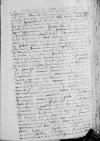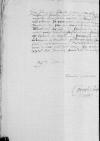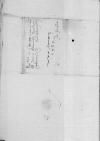List #886
Cornelis DE SCHEPPER do Ioannes DANTISCUSInnsbruck, 1533-01-25
Rękopiśmienne podstawy źródłowe:
Podstawy źródłowe - stare druki:
Publikacje:
| ||||||||||||||||||||||||||||||||||
Tekst + aparat krytyczny + komentarzZwykły tekstTekst + komentarzTekst + aparat krytyczny
Reverendissimo in Christo Patri et Domino, domino
In
Salutem plurimam.
Vehementer angor animi, quod de te nihil audio. Scripsi etiam aliquoties neque raro litteras tum a serenissimis
Mitto ad te litteras binas Hispanicas a
Rerum novarum nihil est. Foedus iterum confirmatur in
In principio Februarii iturus est
In aula nostra omnia sunt eadem ut semper. Ego hic haereo et secuturus sum  UUB, H. 154, f. 109v
Ex
UUB, H. 154, f. 109v
Ex
Nescio, quid facturi sumus in ea causa. Credo negotium orig. negocium⌈negotiumnegotium orig. negocium⌉ omne ad vos tandem iri devolutum. Vos videritis.
Si recte valet
Valetudinem tuam cura et me, quod facis, ama.
Ex
Reverendissimae Celsitudinis Vestrae humilis inservitor
[1] The letters mentioned here could be cf.
[2] palam underlined with another colour of ink, probably later
[3] clam faciat underlined with another coulour of ink, probably later
[5] On behalf of the Pope, Lodovico Rodomonte Gonzaga besieged Napoleone Orsini in Vicovaro, in October 1532. Wounded in a fight, Gonzaga died at Vicovaro in December of that year.


